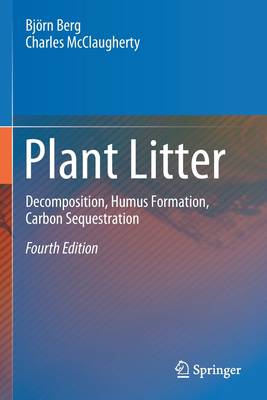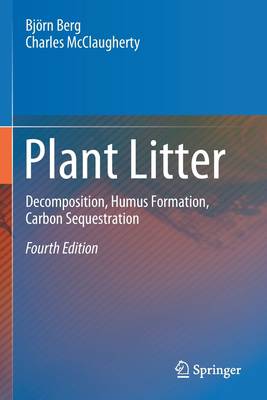
- Afhalen na 1 uur in een winkel met voorraad
- Gratis thuislevering in België vanaf € 30
- Ruim aanbod met 7 miljoen producten
- Afhalen na 1 uur in een winkel met voorraad
- Gratis thuislevering in België vanaf € 30
- Ruim aanbod met 7 miljoen producten
Plant Litter
Decomposition, Humus Formation, Carbon Sequestration
Björn Berg, Charles McClaughertyOmschrijving
This book gives basic facts about litter decomposition studies, which are of guidance for scientists who start studies. Since the publication of the third edition, there has been quite a development not only in the field of litter decomposition but also in supporting branches of science, which are important for fruitful work on and understanding of decomposition of plant litter and sequestration of carbon. A consequence is that 'old established truths' are becoming outdated.
New knowledge in the fields of phytochemistry and microbial ecology has given a new baseline for discussing the concepts 'litter decomposition' and 'carbon sequestration'. We can also see a rich literature on litter decomposition studies using roots and wood as substrates. These have given new insights in factors that regulate the decomposition rate and as regards roots their contribution to sequestered carbon in humus. Additional facts on the role of temperature vs the litters' chemical compositionmay in part change our view on effects of climate change.
Further information on applications of the new analytical technique (13C-NMR) for determining organic-chemical compounds has allowed us to develop these parts.
Focus is laid on needle litter of Scots pine as a model substrate as this species has been considerably more studied than other litter species. Also the boreal/northern temperate coniferous forest has in part been given this role. Still, new information may allow us to develop information about litter from further tree species.Specificaties
Betrokkenen
- Auteur(s):
- Uitgeverij:
Inhoud
- Aantal bladzijden:
- 332
- Taal:
- Engels
Eigenschappen
- Productcode (EAN):
- 9783030596330
- Verschijningsdatum:
- 4/12/2021
- Uitvoering:
- Paperback
- Formaat:
- Trade paperback (VS)
- Afmetingen:
- 156 mm x 234 mm
- Gewicht:
- 489 g

Alleen bij Standaard Boekhandel
Beoordelingen
We publiceren alleen reviews die voldoen aan de voorwaarden voor reviews. Bekijk onze voorwaarden voor reviews.











